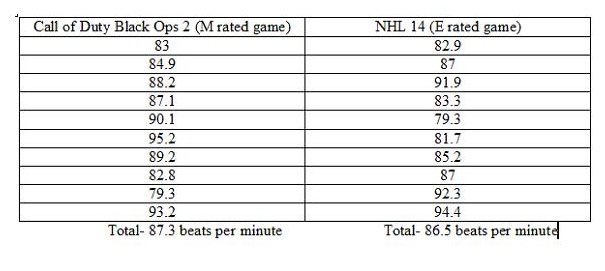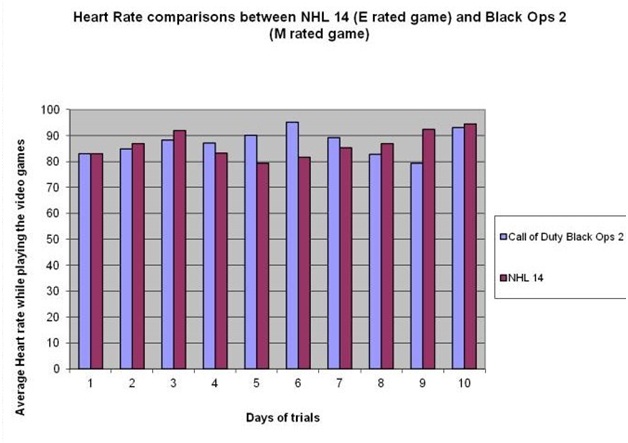





Published on Sep 12, 2023
Heart rate is the rate at which the heart beats. It usually measured to obtain a quick evaluation of a person's health. It is useful because it can help people find out if they are living a healthy life or not. People usually check their heart rate at a doctor’s office or during and after workouts. In my experiment I compared an E rated video game and an M rated video game and tried to find out which one increases my heart rate more.
I tested my heart rate with a heart rate monitor because it would give me the most precise results and it would be the more objective way to get the data needed. The first portable heart rate monitor was invented in 1977 by the Finnish National Cross County Ski team.
Today, it is used to check your heart rate at home instead of going to the doctor. As the heart beats, an electrical signal is transmitted through the heart muscle in order for it to communicate to the heart rate monitor. This electrical activity can be detected through the skin. The transmitter part of the heart rate monitor is placed on the skin around your chest where the heart is beating, and it picks up a signal. The transmitter then sends an electromagnetic signal containing heart rate data to the wrist receiver, which displays the heart rate. Simple or cheaper heart rate monitors may only show you the heart rate at a given time or moment. More high-end heart rate monitors are available.
They not only show the heart rate, but can be set to record time, calculate average and maximum heart rate for an exercise period, and can play an alarm when a person reaches or exceeds a pre-determined heart-rate. Most video games are usually E rated; for Everyone or M rated; for Mature audience. In an M rated game, the content is blood and gore, intense violence, strong language, subjective themes, and sometimes use of drugs
Most video games are usually E rated; for Everyone or M rated; for Mature audience. In an M rated game, the content is blood and gore, intense violence, strong language, subjective themes, and sometimes use of drugs. In an E rated game, the content is usually mild violence, mild language, and blood and gore. My experiment which determines the variation in heart rate while playing video games is useful because it can test the difference in the amount of stress an M rated video game puts on an individual player as compared to that produced by an E rated video game. The normal heart rate for an average person is between 60 to 100 beats per minute. Video games that are usually calm and played while sitting down lead to a small rise in a persons heart rate.
However, violent video games played while sitting down, and also those that require light physical activity, turn out to increase the heart rate by an average of about 20 beats per minute. Video games that require intense physical activity can increase a persons heart rate by a large amount such as by 75% to 100%. It usually depends on the age of the player. With age an average healthy persons heart rate goes down. When a person is a child their average heart rate is suppose to be at around 100 beats per minute. The heart rate goes down to about 90 beats as the child becomes in the range of 10 to 12 years old. At around the age of 18 the average heart rate falls drastically between 55 beats per minute to 90 beats per minute, with an average of 75 beats per minute.
Once the person becomes an adult the heart rate rises and becomes between 60 beats per minute to about 100 beats per minute. In my experiment, I tried to find out what video game increases my heart rate more. The result was that the M rated video game increased my heart rate more than the E rated video game but it was only by about 1 beat. Since the average increase in heart rate was nearly insignificant, it led me to believe that there isn’t much of a difference in the amount of stress produced while playing either video game rating. However, it was still higher than that of my resting heart rate by 31.9 beats per minute. Video games may affect the heart rate directly or indirectly affect our health. Research has also revealed that playing video games help burn calories, lose weight, and could replace the need for outdoor activities in the future. The factors that affect heart rate can be physical stress, diseased heart, emotional stress, and medication.
Physical stress - Hard work and exercise increase the heart rate of a healthy heart. To meet the body's need of more oxygen, the heart beats faster and faster. In an unhealthy heart, the increased demands for oxygen may injure the heart and cause a slow heart rate. Diseased heart- Heart disease from plaque buildup in arteries can lead to a heart attack, heart failure or irregular heart beats. Irregular heartbeat can affect the heart rate, making it fast or slow. Heart muscle damage can also happen from viral and bacterial illness and use of narcotics, which can also affect the heart rate.
Emotional stress- As part of the human response to psychological stress, is an increase in heart rate. Emotional stress causes the same effects as physical stress. Fear causes the heart to pump faster and harder to provide muscles with necessary energy for protection. I think that some of these factors could have led to an increase in my heart rate during the experiment. Physical stress could have been a factor leading to an increase in my heart rate because I am actively involved in activities such as hockey and basketball. Moreover, the emotional stress from academic related work such as tests, assignments and homework, could have also contributed to an increase in my heart rate. In conclusion, there are various factors that contribute to an increase in heart rate.
My experiment on the effect of violence in video games determined that the stress produced when playing an M rated video game and an E rated video game, does not lead to a very significant variation in heart rate. However, it does increase the heart rate from the resting heart rate by about 75 beats per minute.
To determine the change in my heart rate before, during, and after playing an E rated video game versus an M rated video game.
• Xbox 360
• One M rated game (Call of Duty Black Ops 2)
• One E rated game (NHL 14)
• Heart rate monitor
• Stop watch
• Pen
• Paper

1. Pick an E rated video game and an M rated videogame.
2. This experiment used “ Call of Duty Black Ops 2” as an M rated video game and “NHL 14” as an E rated video game.
3. Play each game for 10 days for 30 minutes each day.
4. For each time a game is played, the heart rate must be recorded before the game and in every 5 minute intervals during the game.
5. Record the data on a sheet of paper
6. Calculate the data on a sheet of paper every time a game is played.
7. Repeat steps 4-6 for both video games for 10 days each.
8. At the end of the 20 day period 70 trials of heart rate must be recorded for each game.
9. In this experiment each game has been played at 7 pm in the same room, on the same couch, after dinner, and also the same room temperature. 10. This experiment will determine weather an E rated video game or an M rated video game will increase my heart rate more.
In my hypothesis I predicted that the M rated video game will show a greater increase in my heart rate than an E rated video game. The M rated video game is Call of Duty Black Ops 2 and the E rated video game is NHL 14. My hypothesis was correct but the M rated video game only increased my heart rate by less than 1 beat. Over all there was no significant results because the heart rate would usually increase and decrease by 5 beats. The only abnormal day for NHL 14 was on the 4th day of testing when my average heart rate was 94.7 but on the 5th day it was 79.3.
With Call of Duty Black Ops 2 my heart rate only had one abnormal day abnormal day. On the 8th day my heart rate was 93.5 but on the 9th day my heart rate was 79.3. These were the only abnormal problems. I think that the rising and falling pattern b and average of 5 was created because some games were slow. With my research I found out that video games do simulate a rising and falling pattern in your heart rate and there is nothing abnormal about it. The sudden drop in my average heart rate during certain games could have been due to the fact that the game was of a slower intensity or because my body was not used to the game. It could have also been due to the amount of violence in the game.


My conclusion was that the M rated video game (Call of Duty Black Ops 2) increased my heart rate more then the E rated video game (NHL 14), thus making my hypothesis correct. The E rated video game (NHL 14) did increase my heart rate but it was still less then the how much the M rated video game (Call of Duty Black Ops 2) increased my heart rate. This is because Call of Duty Black Ops 2 is a more violent games and violence increases your heart rate.
www.google.com
www.wikipedia.com
www.medscape.com
www.emedicinehealth.com
www.medicinenet.com
Heart Rate by Alice, Margaret